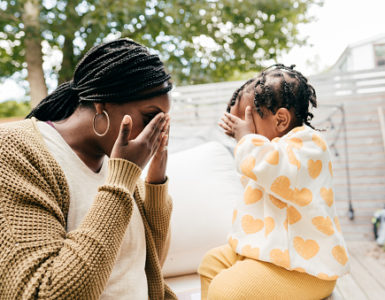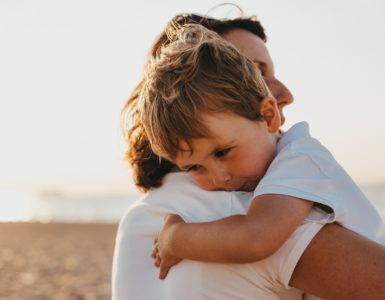The adoption world has changed drastically from what it was 50 years ago. Adoption is no longer a secretive, shameful thing (although some older folks are still getting used to this idea). Open adoption can be such a beautiful experience for all sides of the triad and especially beneficial for the adoptee. Wondering who your biological family is for your whole life is traumatic and stressful. Openness can ease some of this stress.
Aside from the stress being unhealthy, a closed adoption can also lead to problems down the road physically. There may be genetic health conditions you won’t be aware of—diseases that you wish you would have known about that are passed down through families. For instance, some women today opt for a mastectomy if they have high-risk breast cancer genes and a family history of cancer. In a closed adoption, you will not have access to these medical records.
Agencies like to use terms like “open,” “semi-open,” and “closed” to describe the types of adoption, but the terms are essentially broad guidelines. Your post-adoption contact agreement will vary from family to family. In general, open means some type of contact with the birth mother. Closed means there is no contact. The records are sealed, and the child won’t meet her birth mother, especially before age 18. After that, you may have heard of a reunion to describe when a child finds her birth mother. Sometimes, it happens; sometimes, it doesn’t. It just means they found each other and met, not that the child “goes back to” the birth mother. This can be done if both are searching on an online adoption registry. An adoptee over 18 can also ask for court orders for birth records. Today, most adoptions are open to some degree (“semi” or fully open). It is well-known, and studies have shown openness is beneficial for the adoptee.
The agreement you sign with the birth mother is a baseline, meaning that is what she and the adoptive family are comfortable with at that time. It can change over the years. What you have signed does not have to be set in stone if both parties want it to change. Legally speaking though, the adoptive parents are responsible for, at minimum, what is written in the agreement. If all that is written is pictures and letters twice a year and the adoptive parents do not provide that to the birth mother, she can take legal action. What is more likely the case; however, is that the agreement becomes more open over time as the birth mother and adoptive parents get more comfortable with each other and build a trusting relationship.
So what is the open adoption definition? We have an open adoption with our son’s birth mother. Our contact agreement states we will provide pictures weekly and visits twice a year. Since then, it has changed. We did not officially sign a new agreement; we just do what we want that’s best for our families and have the trust that nobody is going to take things to court. We now have contact with the birth mother’s whole family. We’ve met them all over the last four years. We don’t do weekly emails anymore simply because about a year or two into the adoption we agreed to add each other as friends on Facebook and Instagram. That way, since I’m posting photos anyway, she can just see them whenever she wants. I did ask her though, since our agreement does state weekly emails, if she would like me to continue that. She said it wasn’t necessary. We have trust between us that it’s all fine. Nobody has any reason to get the agency involved or cause drama because we are fine with what we have. We also don’t see her twice a year; it’s more like four times. It’s not planned in advance (although I appreciate planning) it just seems to work better for her to do things the week of or last minute.
This is our open adoption definition, but none of this has to be your story, but being open to tweaks of that original contact agreement should be expected. Naturally, any human relationship evolves over time. We didn’t see our son’s birth mother for eight months after adoption. It was really hard for us, surprisingly hard. Then, we began seeing each other more regularly and eventually met her whole family. Having everyone on social media is another way to stay in contact. That said, there are definitely some situations in which having each other on social media is not safe. Everything is a case-by-case basis.
Fear plays a huge role in the contact agreement. Going into adoption, many adoptive parents are scared the birth mother will intrude on their lives. That is a normal fear; however, usually not found to be true. She is not placing the baby for adoption so she can constantly be present. She cannot be present due to financial strain or a bad or nonexistent relationship with the birth father or a myriad of other reasons. She is another regular person who has a job and rent to pay. She is as busy as the adoptive parents are; it helps to remember that we are all just doing our best in this life. In our case, I contact our son’s birth mom far more than she contacts me, which is the complete opposite of what newbie adoptive parents expect. So fear not, hopeful adoptive parents, intrusion is usually not an issue. If it ever is, you have a helpful third party: your adoption agency to help set healthy boundaries and talk to everyone from a neutral standpoint.
I’d also like to point out how, in the digital age, it is harder than before to keep things private. It can definitely be done, but there are many more places where things can slip through the cracks on accident. Take the hospital our son was born in; we were given information about the birth mother that we should not have had access to. Fortunately, our relationship with her is so open anyway that it didn’t matter, but in other cases, it may be a bigger deal. We were told her address, which we weren’t supposed to know. It was as simple as a hospital worker slipping up. We were there after the birth mom was discharged, and our son was getting blood work rechecked for jaundice. At the lab, when we were checking in, they were trying to locate him and identify him in the system. We gave his name and the worker said, “Ok, is your address (blank blank blank)?” And I said, “No, that’s probably his birth mom’s address.” Later that was confirmed when we went to her house. The hospital worker should have said “What is your address?” instead to avoid this slipping of information. I did call the hospital and tell them about this so it wouldn’t happen in the future.
We are still a waiting family for our second adoption, but we did have a disrupted adoption in the process about a year ago. We were matched with an expectant mom and met her a few times before she ultimately decided to parent her child. We all felt it really was for the best so we have no hard feelings about it. What happened once during that process, though, was a simple email address got left on some paperwork. We did not have the last name of the birth mother, and she did not have ours; we were on a first-name basis. When that email address was accidentally shown to us, it had her first name and last name in it. Then, I knew her last name, and therefore, I could have found her social media too. My point being, it may be good to put your social accounts on private or so that people who aren’t friends can’t search for you.
Yet another way people can connect with their biological relatives is through DNA or ancestry services. I’m the only person in my immediate family who provided saliva for my ancestry results, just for fun, and I saw my second cousin on my results, meaning she had done the test as well. Even if an adoptee hasn’t found his biological mother on an ancestry site, he may find other family members like cousins and be able to contact them and find out eventually who the rest of the family is. I think it’s best to assume if you’re adopting at some point, either from the beginning or after age 18, that your child will know who some of his biological family is. My opinion is your child has a right to know. Every situation is different, and some birth moms won’t want to reconnect. Maybe the child was conceived of rape, and then it’s a question of do they even want to know who the birth father is? Is it the adoptee’s burden? Is it the birth mom’s wish to keep that secret to protect the adoptee? There are no clear answers in situations like this, so it’s important for the adoptee to have clear communication with his or her adoptive parents to best understand the adoption story. I hear many conversations about this in the adoption community: should the adoptee know if he or she was conceived from rape? Are adoptive parents supposed to keep it a secret? Which is healthier? These are such hard questions, and I don’t think there is a one-size-fits-all answer.
Open adoption is not without possible complications, but that’s any human relationship. In the four years we’ve known our son’s birth mother, we have only really gotten into one heated argument or misunderstanding, and it wasn’t even about adoption. Other than that, our open adoption has been beneficial for everyone. That isn’t to say it isn’t hard for the birth mom. Grief comes in waves and at different times in life. Birth mothers can greatly benefit from going to therapy and especially going to a birth mom’s group at their respective agencies to connect with other women who went through the same thing. It can also be hard for us as adoptive parents to know she hurts sometimes. We tend to feel guilt, even though we don’t need to. What I cannot imagine; however, is feeling the guilt of choosing a closed adoption just for no reason other than fear. Remember, you will have to answer to your child one day.
The openness in adoption today is interesting to me for another reason—those who choose IVF over adoption sometimes have to wrestle with the same questions. Sperm donation means someone is going to have to decide whether the birth father’s identity is known. Is it the donor himself who allows himself to be open to meeting his child one day? Is it the parents who choose to keep the birth father’s identity secret or choose for him to be known? Someone has to decide. I’ve heard stories of men giving sperm donation which resulted in many children, not just one child. It will be interesting to see how many men choose to be open in meeting those children. We live in interesting times, that’s for sure.
I’ll leave you with this quote that sums up our experience with open adoption: “Open adoption is when your family tree becomes an orchard” – unknown. What we have found is that everyone in his birth family just wants to love him (with the exception of the birth father not wanting involvement which still saddens me, but there’s nothing I can do). Our son has more family to love him than an unadopted person. There is also pain involved, no doubt, but from my perspective, openness is the way to go. Prior to adoption, we thought we wanted a closed adoption because we were scared and ignorant. Then we met his birth mom. Then we emailed her. Then we visited with her. Then we texted her. Then we met her mom’s side of the birth family. At our son’s 4th birthday, he had three grandmas, three grandpas, two moms, a biological aunt and cousins, and tons of friends. He doesn’t realize yet how wonderful that is that everyone is coming together for him. We aren’t closed off; we are all present. This is the open adoption definition for our family.




